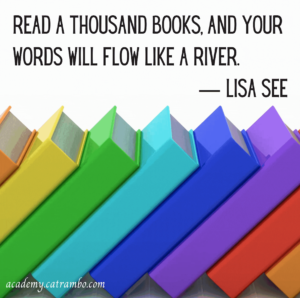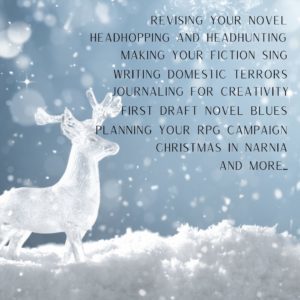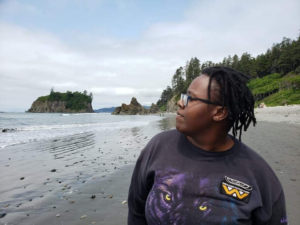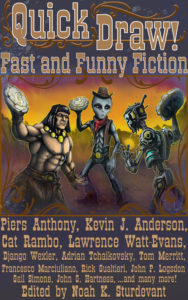Cat Rambo's Blog, page 14
December 1, 2020
Reading Like a Writer: Planning It Out
 Tracy Townsend just did a terrific workshop this Saturday on Reading Like a Writer, (here’s the highlights from Twitter). One thing I came away with is the idea of planning my reading — or at least some of it — out much more purposefully.
Tracy Townsend just did a terrific workshop this Saturday on Reading Like a Writer, (here’s the highlights from Twitter). One thing I came away with is the idea of planning my reading — or at least some of it — out much more purposefully.
When we did introductions and talked about what people wanted out of the class, it struck me that two ideas kept surfacing. One was the idea of using an activity one loves — the majority of writers are avid readers — to hone one’s craft would be more efficient. The second was a sense that if one was enjoying the writing, such learning couldn’t be happening; that work and joy could not go together.
I heartily disagree with the second, because I constantly draw on the first. Perhaps because now, as in the past, I am perpetually swimming in books, and consider that a dream existence. I was one of those kids who spent most of their hours with their nose inside a book, and at a time when the Internet was yet to appear, so I read and re-read over and over again, particularly L.M. Boston, Zenna Henderson, C.S. Lewis, Andre Norton, Theodore Sturgeon, J.R.R. Tolkein, to name a few.
Nowadays I get sent a lot of books — some attractive, some not so much — partially as a result of the somewhat scattershot way that most publisher marketing departments work, partially because I’m in a lot of anthologies, and partially because I am doing my best to support authors by buying their books through indie booksellers. I also pick up a lot of Storybundles and Humblebundles. While I’m a very fast reader, I’m not fast enough to keep up with the deluge.
So I like the idea of taking the last week of each month to plan the next month’s reading, particularly with an eye to assembling it. Tracy mentioned doing like assembling a D&D adventuring party, making sure it’s a mix. Her suggestions were these categories, all of which may overlap:
authors who inspire and excite you
authors who bring diversity to your reading list
authors who people keep saying you should read
authors who are great at the things you need to work on
Here’s some of the things I want to add to that for my personal plan:
Some current novelettes/novellas. These get overlooked sometimes because they’re usually something best suited to the electronic, but we’re also in the midst of a resurgence of them, and I want to make sure I keep myself of what’s going on there.
Because I’ve been trying to educate myself better about mid-to-late 20th century F&SF history, at least one nonfic book about it and one anthology produced during that period.
At least one nonfiction book that is not about gardening or cooking each month.
So here’s my rough notes as I create my reading list for December. I usually read 20-30 books each month, so I’m going to plan out 15 and leave the rest sort of up to the moment.
N.K. Jemisin Emergency Skin – novella, huzzah!
Diversity – this month I’m going to add a few more LatinX authors to the mix, having read a piece with some recommendations, while also finishing up the collection of Harlem Renaissance novels I started last month. I’ve added two from their list I wasn’t familiar, Felix J. Palma and Adam Silverta, and will find a book from each.
Classic – Walter Tevis The Man Who Fell to Earth. I enjoyed the series based on Tevis’s The Queen’s Gambit, but in looking at it, I decided to go with this instead since it’s a pretty classic book that I’ve never read.
Classic anthology-wise, I’ve got a ton on my shelves, so I’ve snagged Orbit 3, edited by Damon Knight. I also bought a collection that’s worth working my way through, The Avram Davidson Treasury: A Tribute Collection, particularly since I want to look at Davidson’s methods of storytelling. For nonfiction that fits into that reading project, I’m adding Lost Transmissions: The Secret History of Science Fiction and Fantasy by Desirina Boscovich, which just arrived in the mail and is a handsome looking book.
Nonfiction books I recently picked up include NeuroTribes: The Legacy of Autism and the Future of Neurodiversity by Steve Silberman; American Rule: How a Nation Conquered the World but Failed Its People by Jared Yates Sexton, How to Change Your Mind: What the New Science of Psychedelics Teaches Us About Consciousness, Dying, Addiction, Depression, and Transcendence by Michael Pollan; Gender Outlaw: On Men, Women and the Rest of Us by Kate Bornstein. I’m halfway through the last, so I’ll plan on finishing it and reading at least one of the others.
Looking over my Kindle – man, there is a ton of other stuff I downloaded and would like to get to, so I need to stop buying books until I’ve cleared at least SOME of this away.
Only the Devil is Here by Stephen Michell
Nophek Gloss by Essa Hansen
The Wall by Gautam Bhatia
The Left-Handed Booksellers of London by Garth Nix
The Six-Gun Tarot by R.S. Belcher
The Afterward by E.K. Johnston
The Order of the Pure Moon Reflected in Water by Zen Cho
Banshees by Mike Baron
Touched by Venom by Janine Cross
Brimstone Angels by Erin M. Evans
*starts to add others then goes aiiieee and runs around in circles for a while instead*
I’m still pondering the various notetaking methods Tracy talked about, but certainly reading more mindfully seems worthwhile. Will any of this be useful? I dunno, but it can’t hurt, and in the meantime I get to read.
November 30, 2020
Rambo Academy Campus Calendar for December 2020
Zoom links will be available on Patreon and pinned in #localannouncements on the Discord server.
How do you get access to these events? Details are here, but basically you can subscribe through Patreon or Paypal. There are free scholarships.
Event explanations:
Unmoderated co-working. Log on and work with other Chez Rambo peeps. Does not have to be writing. Structure is up to the participants.
Moderated co-working. Cat or designated other will lead three thirty minute sprints, with check-ins to say how we’re doing in between. Does not have to be writing.
Chillax and chat:. Hang out and craft or clean your virtual or real workspace while we talk about stuff.
Story discussion group. Story changes every two weeks; titles and links will be posted on Discord and Patreon. Additional resources will be in #thepanel channel on Discord.
Writing Games. Bring a prompt if you like. We all write for 10 minutes to the same prompt, then people who want to share theirs. Then we do that a couple more times. Great jolt of creativity.

Tuesday, December 1
Co-working sessions: 12-3 AM, 8:30-10:30 AM, 1-3 PM, 6:30-8:30 PM
Wednesday, December 2
Co-working sessions: 12-3 AM, 8:30-10:30 AM, 1-3 PM
Morning Writing Games 11-12 PM
Short Story Discussion Group 4-5 PM (Pam Zoline, The Heat Death of the Universe)
Thursday, December 3
Co-working sessions: 12-3 AM, 8:30-10:30 AM, 1-3 PM, 6:30-8:30 PM
Friday, December 4
Co-working sessions: 12-3 AM, 8:30-10:30 AM, 1-3 PM
Chillax and chat: 10-11 AM
Saturday, December 5
Co-working sessions: 12-3 AM, 8:30-10:30 AM
Head Hopping and Head Hunting: Deep Point of View Writing with Tracy Townsend, 9:30-11:30 AM Pacific Time.
Revising Your Novel with Kate Heartfield, 1:00-3:00 PM Pacific Time.
Sunday, December 6
Co-working sessions: 12-3 AM, 8:30-10:30 AM
Make Your Fiction Sing: Songwriting Techniques that Carry into Prose with Sarah Pinsker, 9:30-11:30 AM Pacific Time.
It’s Coming from Inside the House: Writing Domestic Dangers and Haunted Homes with Evan J. Peterson, 1:00-3:00 PM Pacific Time.
Monday, December 7
Co-working sessions: 12-3 AM, 8:30-10:30 AM, 1-3 PM
Tuesday, December 8
Co-working sessions: 12-3 AM, 8:30-10:30 AM, 1-3 PM, 6:30-8:30 PM
Wednesday, December 9
Co-working sessions: 12-3 AM, 8:30-10:30 AM, 1-3 PM
Short story discussion group :11 AM- 12 PM
Writing Games: 4-5 PM
Thursday, December 10
Co-working sessions: 12-3 AM, 8:30-10:30 AM, 1-3 PM, 6:30-8:30 PM
Friday, December 11
Co-working sessions: 12-3 AM, 8:30-10:30 AM, 1-3 PM
Chillax and chat:: 10-11 AM
Saturday, December 12
Co-working sessions: 12-3 AM, 8:30-10:30 AM
Planning Your Tabletop RPG Campaign with Monica Valentinelli, 9:30-11:30 AM Pacific Time.
The First Draft Novel Blues: How to Revise and Rewrite with Cat Rambo, 1:00-3:00 PM Pacific Time.
Sunday, December 13
Co-working sessions: 12-3 AM, 8:30-10:30 AM
Story Structure for Novella Writers with Margaret Dunlap, 9:30-11:30 AM Pacific Time.
Christmas in Narnia: Creating Traditions for Fictional Cultures with Evan J. Peterson, 1:00-3:00 PM Pacific Time.
Monday, December 14
Co-working sessions: 12-3 AM, 8:30-10:30 AM, 1-3 PM
Tuesday, December 15
Co-working sessions: 12-3 AM, 8:30-10:30 AM, 1-3 PM, 6:30-8:30 PM
Wednesday, December 16
Co-working sessions: 12-3 AM, 8:30-10:30 AM, 1-3 PM
Morning Writing Games 11-12 PM
Short Story Discussion Group 4-5 PM
Thursday, December 17
Co-working sessions: 12-3 AM, 8:30-10:30 AM, 1-3 PM, 6:30-8:30 PM
Cat Reading online (details will be posted), 4:30 PM
Friday, December 18
Co-working sessions: 12-3 AM, 8:30-10:30 AM, 1-3 PM
Chillax and chat: 10-11 AM
Saturday, December 19
Co-working sessions: 12-3 AM, 8:30-10:30 AM
Literary Techniques for Speculative Fiction with Cat Rambo, 9:30-11:30 AM Pacific Time.
Story Fundamentals with Cat Rambo, 1:00-3:00 PM Pacific Time.
Sunday, December 20
Co-working sessions: 12-3 AM, 8:30-10:30 AM
Emotional Impact: How to Punch ‘Em in the Feelz with José Pablo Iriarte, 9:30-11:30 AM Pacific Time. Class is full; waitlist only.
Journaling for Creativity with Fran Wilde, 1:00-3:00 PM Pacific Time.
Monday, December 21
Co-working sessions: 12-3 AM, 8:30-10:30 AM, 1-3 PM
Tuesday, December 22
Co-working sessions: 12-3 AM, 8:30-10:30 AM, 1-3 PM, 6:30-8:30 PM
Wednesday, December 23
Co-working sessions: 12-3 AM, 8:30-10:30 AM, 1-3 PM
Short story discussion group :11 AM- 12 PM
Writing Games: 4-5 PM
Thursday, December 24
Co-working sessions: 12-3 AM, 8:30-10:30 AM, 1-3 PM, 6:30-8:30 PM
Friday, December 25
Co-working sessions: 12-3 AM, 8:30-10:30 AM, 1-3 PM
Christmas Cookie Hangout 10-11 AM
Saturday, December 26
Co-working sessions: 12-3 AM, 8:30-10:30 AM
Creating an Online Presence for Writers with Cat Rambo, 9:30-11:30 AM Pacific Time.
Rewriting, Revising, and Fine-Tuning Fiction with Cat Rambo, 1:00-3:00 PM Pacific Time.
Sunday, December 27
Co-working sessions: 12-3 AM, 8:30-10:30 AM
Writing Your Way Into Your Novel with Cat Rambo, 9:30-11:30 AM Pacific Time.
Beginnings and Endings with Cat Rambo, 1:00-3:00 PM Pacific Time.
Monday, December 28
Co-working sessions: 12-3 AM, 8:30-10:30 AM, 1-3 PM
Tuesday, December 29
Co-working sessions: 12-3 AM, 8:30-10:30 AM, 1-3 PM, 6:30-8:30 PM
Wednesday, December 30
Co-working sessions: 12-3 AM, 8:30-10:30 AM, 1-3 PM
Morning Writing Games 11-12 PM
Short Story Discussion Group 4-5 PM
Thursday, December 31
Co-working sessions: 12-3 AM, 8:30-10:30 AM, 1-3 PM, 6:30-8:30 PM
November 27, 2020
Black Friday through Cyber Monday Deal
I always feel like I should do something special for this weekend, and this year I remembered in time. So this year, for the Thanksgiving blow-out, there’s a big discount on live classes. This applies to all 2020 classes, which means anything taking place before December 31, 2020.
These live classes are $59 to sign up for through midnight on Cyber Monday! The price is good on Nov/Dec 2020 classes only; all available ones are listed below, classes that are already full are not included.

Dunking Your Reader in the Details: Toolsets for Creating Immersive Worlds with Cat Rambo, Saturday, November 28, 2020, 9:30-11:30 AM Pacific Time.
Diversity Plus: East Asian Storytelling Forms and Themes with Henry Lien, Sunday, November 29, 2020, 1:00-3:00 PM Pacific Time.
Head Hopping and Head Hunting: Deep Point of View Writing with Tracy Townsend, Saturday, December 5, 2020, 9:30-11:30 AM Pacific Time.
Revising Your Novel with Kate Heartfield, Saturday, December 5, 2020, 1:00-3:00 PM Pacific Time.
Make Your Fiction Sing: Songwriting Techniques that Carry into Prose with Sarah Pinsker, Sunday, December 6, 2020, 9:30-11:30 AM Pacific Time.
It’s Coming from Inside the House: Writing Domestic Dangers and Haunted Homes with Evan J. Peterson, Sunday, December 6, 2020, 1:00-3:00 PM Pacific Time.
Planning Your Tabletop RPG Campaign with Monica Valentinelli, Saturday, December 12, 2020, 9:30-11:30 AM Pacific Time.
The First Draft Novel Blues: How to Revise and Rewrite with Cat Rambo, Saturday, December 12, 1:00-3:00 PM Pacific Time.
Story Structure for Novella Writers with Margaret Dunlap, Sunday, December 13, 2020, 9:30-11:30 AM Pacific Time.
Christmas in Narnia: Creating Traditions for Fictional Cultures with Evan J. Peterson, Sunday, December 13, 2020, 1:00-3:00 PM Pacific Time.
Literary Techniques for Speculative Fiction with Cat Rambo, Saturday, December 19, 2020, 9:30-11:30 AM Pacific Time.
Story Fundamentals with Cat Rambo, Saturday, December 19, 2020, 1:00-3:00 PM Pacific Time.
Journaling for Creativity with Fran Wilde, Sunday, December 20, 2020, 1:00-3:00 PM Pacific Time.
Creating an Online Presence for Writers with Cat Rambo, Saturday, December 26, 2020, 9:30-11:30 AM Pacific Time.
Rewriting, Revising, and Fine-Tuning Fiction with Cat Rambo, Saturday, December 26, 2020, 1:00-3:00 PM Pacific Time.
Writing Your Way Into Your Novel with Cat Rambo, Sunday, December 27, 2020, 9:30-11:30 AM Pacific Time.
Beginnings and Endings with Cat Rambo, Sunday, December 27, 2020, 1:00-3:00 PM Pacific Time.
To register for a class, send e-mail with the following details:
Which class or classes and the dates.
Whether you would prefer to pay via Paypal, Venmo, check, or some other means.
You should receive confirmation of your registration within 48 hours.
Classes are taught online via Zoom and are limited to fifteen students; there are scholarships available. Webcam is suggested but not required. If you have schedule or other issues preventing participation, contact me and we can arrange access to the video afterward.
Fiction Reading: Hands (Prose Poem)
This prose poem appeared last century! 1997 to be precise. It originally was printed in small press magazine Dreams & Nightmares. It features dancing mice, dreams, and of course…hands.
November 25, 2020
Fiction Reading: Tongues of Moon/False Toads
Because who doesn’t like a good toad story?
November 19, 2020
Round-up of Awards Posts by F&SF Writers, Editors, and Publishers for 2020
It’s that time again! Once again I have created this post for consolidating fantasy and science fiction award eligibility round-ups. If you are an F&SF writer, editor, podcast, or publisher working in comics, fiction or games, I hope you’ll let people know what you have that they should be reading. People on my Discord server have already been gently prodded about this.
Past things I have written about why writers should do this include On Awards: To Be Pushy Or Not To Be Pushy (2014), The Spontaneous Knotting of an Agitated Awards Process (2015), and To Eligibility Post or Not to Eligibility Post? (2016).
Here are the previous such posts from 2017, 2018, 2019
Here are the guidelines that save us both work. It’s best if you e-mail me to add your name and link. I need to know your name, what categories you fit in, and the single URL that lets people find the works. Fair warning: If I have to click through multiple links in order to figure out your name and which category you should be put in, it will slow me down and make me cranky.
A.C. Wise maintains a similar list here.
Here are the SFWA recommended reading lists. These lists are the suggestions made by members of the Science Fiction and Fantasy Writers of America and represent pieces they found particularly read-worthy over the course of the year. Appearance on the list is NOT the same thing as a Nebula nomination.
Novel
Novella
Novelette
Short Story
Games
Bradbury Award
Norton (Young adult/middle grade novels)
Here is the Coyotl Award Recommended List.
Here is the Hugo Award Nominees Wiki
Writers:
G.V. Anderson
Gautam Bhatia
Minerva Cerridwen
Ray Daley
Oghenechovwe Donald Ekpeki
Jennifer Hudak
Zelda Knight
Mary Rajotte
Cat Rambo
Arula Ratnakar
Joyce Reynolds-Ward
Lauren Ring
Frances Rowat
Editors:
Zelda Knight and Oghenechovwe Donald Ekpeki
Lynne and Michael Thomas
Publishers:
Atthis Arts
Uncanny Magazine
Podcasts
If This Goes On (Don’t Panic) (Alan needs to give me the link to this post, hi Alan 
November 18, 2020
Awards-Eligibility Post for 2020
Hello! I have only a scattering of stuff this year (but 2021 is going to be a doozy, I can tell you that right now, because at least two novels, a novelette, appearances in BCS and Mag of F&SF, co-editing an anthology, a non-fiction project, and some other stuff are all coming up, wheeeee!)
Anyhow. When you are reading for awards, here’s what I published in 2020. But if you want a huge batch of them, what you should really do is consult the big post of F&SF awards eligibility 2020 posts that is here — and if you’ve got something that should be on there, let me know.
My favorite story of the year, which appeared in Daily Science Fiction, is “I Decline,” a short story which grew out of a writing prompt, write a complaint letter about an abstract concept. If you’re a SFWA member, I hope you’ll consider adding it to your recommended reading suggestions. Similarly, if you’re reading for the Hugos or Eugie Foster awards, I hope you’ll consider it when nominating. If you’d prefer to listen to it in audio form, I gotcha!.
“Because It Is Bitter” is an alternative-history novella, part of the AND THE LAST TRUMP SHALL SOUND project I did with Harry Turtledove and James Morrow. Want to buy it at Powell’s? Here’s the link.
I wish there were flash fiction awards, both because I appreciate the hell out of well-done flash, but also because I produced a number of good ones this year. Beside the earlier mentioned “I Decline,” the piece I did, At the End of the Song, A Ghost is Waiting, which appeared in Three-Lobed Burning Eye, is another nicely done piece.
“How Joyful the Work” is a clockpunk re-centering of the Odyssey on those left behind with a touch of lesbian romance, written for Predators in Petticoats.
Red Boots Blues is a cyberpunk mash-up of “The Red Shoes” and “The Girl who Trod on a Loaf,” done for the UPON A ONCE TIME anthology from Air & Nothingness Press. Also fun to write, and I let myself loose with poetic language sometimes. AAN does beautiful books and I picked up some to give as presents this year.
Wayne and I wrote a story together, “Stand and Deliver,” which appeared in Dark Matter Magazine. We wrote it while on a road trip together, and I hope we’ll do more in the future, because he’s fun to write with!
Patreon stories primarily were installments of serial novella Baby Driver, a #hopepulp focused on Pat Savage, cousin of Doc Savage, and her crew of five bad-ass women, but there were a number of flash pieces, snippets, and roughs from playing writing games.
I am part of a podcast this year! In 2020 we kicked off hopepunk-centered If This Goes On (Don’t Panic), cohosted by Alan Bailey, Diane Morrison, Rachel Renee, and myself. I can take very little credit for this project, but great pride in being associated with it, and we’ve had some awesome episodes over the course of our first year.
Update: The Reinvented Heart
 We’ve got the details finally nailed down a bit better on this project and so I am posting an official announcement.
We’ve got the details finally nailed down a bit better on this project and so I am posting an official announcement.
I am very delighted to say that Jennifer Brozek is co-editing. Jenn’s put together a couple of dozen anthologies and I am ecstatic to have her organizational skills, keen editing eye, and sharp publicity skills on the project. I am very grateful that she’s signed on, because I looked at the amount of work already piled on my plate for the coming year and was panicking. This project is happening because she’s agreed to do it.
In the convulsions, I am afraid I have shortchanged the slushreaders. I throttled back on soliciting submissions during the month they were open and didn’t conduct the training sessions that I meant to do. What I would like to do, if you are on the list for that (and I’m going to send out an e-mail about this as well) is give you folks a Zoom session where we get to talk about slushreading in a way that may be useful and also keep you on a list for my next project.
Everything else remains the same except that solicited stories have a bit more time in their deadlines! If you submitted a story, it is still under consideration. Some of the solicited stories have been arriving and we’re both excited about the project coming out mid-way through 2021 from Arc Manor.
November 17, 2020
Guest Post: We Are Not Entertained by Aigner Loren Wilson
There’s this common misconception that the world of editing (in the sense of submitting your story to a magazine or contest) is an absolute puzzle constantly being shifted around by angry and jaded editors. In classes, writing groups, and even among non-writers, I hear it repeated that you have to have this unknowable combination of luck and talent to land a spot in a magazine, and it isn’t worth trying or learning. You got it or you don’t.
But that type of thinking leaves most people without it.
I want to say that in my years as a reader, judge, and developmental editor none of that is true. Especially about editors. We’re not shadowed goblins lying in wait to crush every writers’ dream. The reason we got into this line of work is because we want to hear a good story, a new story. We want to be entertained.
But unfortunately, most of the time, we are not. We are left wondering where’s the story.
And after a few years, I realized that most stories don’t make it because of the same reasons. Time and time again, I open a submission (always reading without knowing the info of the author) and come across the same mistakes or faults in stories that keep a cool or fun idea from making it from a submission to an acceptance. Dear writer, I’m going to tell you these faults so that you can identify them in your own stories and make it out of the slush pile.
Because I do really want to see your stories out there. Even if I never read them, someone will, and they will love them.
One of the common issues I come across are dark openings. A dark opening is when a writer aims to be mysterious but doesn’t give the reader anything to hold on to. Often, the story opens with two characters exchanging a few lines of dialogue while doing some mundane task that is an overarching metaphor for the story. That in itself isn’t bad and can be found in a lot of great stories, but where the stories fail is in how they do this.
In dark openings, characters, along with their dialogue, are usually nondescript to the point where you can’t really tell who is saying what because everyone sounds the same, and they aren’t really having a conversation but are merely stating the story in a heavy-handed way. The correct way in doing these mysterious dialogue driven openings is to use metaphor less like metaphor and more like subtext so that the point comes in without feeling like it’s being fed to the reader. And, of course, all dialogue should be distinctive to the characters, but this is even more so important in an opening.
Not only does it show the reader the characters, but it shows them that you’re an author who knows your story and characters. It builds that very necessary and crucial bridge of trust between the writer and the reader.
Another thing that holds writers back is telling their story to the reader instead of showing their story to the reader. Commonly known as telling vs showing. Based on the stories I’ve read, my theory behind this bit of advice not sinking into writers is that they misunderstand what it means to show and to tell. Writers tend to do a lot of in your face telling masking as showing. For instance, during a fight scene, the reader will get a blow by blow of flailing arms and legs.
But that is not showing.
Showing does more than just show. Showing makes the reader feel. It calls forth the image of the scene or character to the reader’s mind. There are many ways to do this, but the top way is by using descriptive language and sentence structure to control reader emotion and story. Instead of giving a blow by blow of action, give a blow by blow of evocative internal workings. How does your character feel when slicing into their foe or friend or lover? Use the right words in the right order to create magic.
The final issue that many stories have, though there are many more, is that they start too late. For a story of any length, the editor looks for whether or not the writer has introduced world, theme, problem, and character within the first paragraph. But a lot of writers, choose to open their stories with something that they think will grab the attention of the reader or will paint a picture of the setting. But what will tell an editor of place or grab their attention won’t actually cue them in on what is important to this story and to the character.
Openings should introduce world, character, and problem at least on the first page. When it is not introduced, the editor is left wondering where the story is going, instead of wrapped up in its progression.
As you will have noticed, most of these issues happen in a story’s opening. That’s the only space you really have to win a reader or an editor over. And editors can feel or sense whether or not the story they dive into is written by a writer that knows what they are doing or by a writer who is just phoning it in because they don’t think they have to try.
If you take issue with this article and feel as though I am lying to you, then I leave you with this: it is my firm belief that every writer should become a slush reader, so that they may see the wide array of mistakes laden in stories. It will not only help you realize your own faults, but it will also show you that I am right.
 BIO: Aigner Loren Wilson is a SFWA, HWA, and Codex writer whose stories and articles have appeared in Terraform, Rue Morgue, Arsenika, and more. She writes or edits for Strange Horizons, Nightlight: A Horror Podcast, NYC Midnight, and other outlets. To keep up to date on where she is publishing and other news, sign up for her newsletter, follow her on Instagram, or follow her blog.
BIO: Aigner Loren Wilson is a SFWA, HWA, and Codex writer whose stories and articles have appeared in Terraform, Rue Morgue, Arsenika, and more. She writes or edits for Strange Horizons, Nightlight: A Horror Podcast, NYC Midnight, and other outlets. To keep up to date on where she is publishing and other news, sign up for her newsletter, follow her on Instagram, or follow her blog.
If you’re an author or other fantasy and science fiction creative, and want to do a guest blog post, please check out the guest blog post guidelines. Or if you’re looking for community from other F&SF writers, sign up for the Rambo Academy for Wayward Writers Critclub!
November 11, 2020
Guest Post: Comedy Is a Ninja by Noah Sturdevant
Things are tense these days. I hope I’m not shocking anyone by saying that. There’s a lot of negative emotions going around, and people deal with them in different ways. One of the healthier ways is to engage with a good movie, game, book, or other form of media and get lost in a story. As a person empathizes with characters, they achieve catharsis as they experience their emotional journey together with the characters they empathize with. People enjoy dramas to release their sadness, they enjoy action to feel power over a world which often shows them to be powerless. Some enjoy horror for the endorphin rush, or to release pent up negative emotions in a more healthy way than going to the hardware store and looking for a chainsaw that’s light enough to chase someone with, yet not so light that it can’t get the job done.
Um, for example.
You get the idea. Engaging with stories in all of these genres help emotions to be released, and these genres are taken more or less seriously as their own entity. They win awards, they get critical acclaim. People feel like they can discuss them as art.
Comedy provokes laughter, which is a way to achieve catharsis, too. Laughter is a bonding experience. Laughter allows us to cope with horrible situations. Laughter is, well, fun. Yet, somehow comedy doesn’t get the respect it deserves.
What is the last purely comedic book you read? Not the action-comedy, horror-comedy, romantic comedy, etc. It might be hard to remember.
It seems most times comedy is only accepted when it tags along with another genre. If genres were families, comedy would be the little brother that horror, action, romance, mystery, westerns, science fiction, fantasy, and drama are forced to drag along with them if they want to go out and play.
If you look at Amazon, or any other place to buy books, you’ll probably notice the comedy/humor section is dwarfed by the other genres. In fact, it’s lumped in with crosswords and other puzzles in some stores.
Why is that? Probably because comedy doesn’t sell. Somehow comedic novels don’t get the same attention as other genres, which is why they have to piggy-back onto them. It’s hard to figure out why. On the surface, comedic novels have the same elements as other genres. They have a beginning, middle and end. They have a plot and they have characters.
Maybe that’s where things start to fall apart. People read books for the plot; they read a series because of the characters. As the purpose of a comedy is to laugh, it’s often true that comedic novels don’t have the level of character development that other genres have, and the stakes aren’t often that high. And that’s where the trouble really lies. People need to care what happens in a book for it to grab their attention for long. Sure, some comedic books have deep characters and intricate plots, but chances are that it’s going to get a hyphen with some other genre coming first added to it to sell more copies.
So, wait. Maybe comedy novels are more popular than they first appear. True, the “pure” comedy book isn’t in fashion at the moment, but that doesn’t mean the genre is failing. On the contrary, comedic novels are doing better than ever, thanks to the expectations of modern-day readers.
Unlike in other eras, readers don’t want just one thing. No, they want at least a little of many things. Hybrid genres keep emerging constantly. Weird West, GameLit, and other genre blending categories give people more of what they want, before they even knew they wanted it. And do you know what? I bet they’ve all got a few jokes in them, too. Really, the hyphen is a friend. It’s the hook that gets comedy into your books, into your hands, and into your head.
By latching onto a larger genre, like a parasite, comedy sneaks into your favorite genres without you even noticing. Or like ninjas. Let’s say comedic books are giggle ninjas instead of parasites. Still sneaky, but less slimy. The point is, that fantasy book that made you laugh more than want to swing a sword around was a comedy novel. The horror story that made you chortle with almost shameful glee every time someone bit the big one was humor in disguise.
Comedy doesn’t have an ego. It doesn’t care if it gets second billing. No, comedy is flexible. It adapts to survive, to thrive. Like a thief in the night, comedy comes, does what it set out to do, and leaves. The hero still defeats the evil mastermind, the prince still wins the heart of the prince, princess, or whoever they’ve been trying to win over, and so on. They just do it with a little snark, a bit of whimsy, and the occasional laugh out loud moment.
Comedy never left, and it isn’t going anywhere, even if you can’t quite see it at the moment.
 BIO: Noah Sturdevant is a man of many secrets. Granted, most of his secrets involve lost socks and conspiracy theories about otters, so it’s probably better not to probe too deeply. Noah is originally from the U.S.A., and currently lives in Thailand with his wife and daughter. Noah never really knows what’s going on and isn’t sure why he’s writing about himself in the third person, but he hopes you enjoy his books, which you can find on Amazon.
BIO: Noah Sturdevant is a man of many secrets. Granted, most of his secrets involve lost socks and conspiracy theories about otters, so it’s probably better not to probe too deeply. Noah is originally from the U.S.A., and currently lives in Thailand with his wife and daughter. Noah never really knows what’s going on and isn’t sure why he’s writing about himself in the third person, but he hopes you enjoy his books, which you can find on Amazon.
Quick Draw! is an anthology of humorous flash fiction, with some of the biggest names in speculative fiction. In times like these a quick laugh is something we could all use. All profits from the sale of this anthology go to True Colors United, which helps homeless LGBTQ+ teens.
If you’re an author or other fantasy and science fiction creative, and want to do a guest blog post, please check out the guest blog post guidelines. Or if you’re looking for community from other F&SF writers, sign up for the Rambo Academy for Wayward Writers Critclub!





